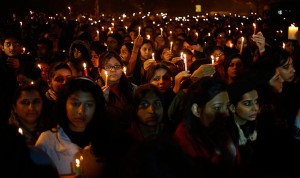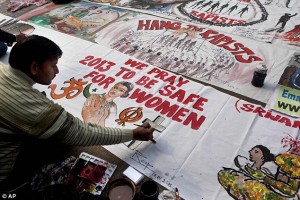The horrific gang rape of a 23 year old medical student in Delhi last month has once again brought a number of serious societal and gender issues to the fore in India. The young girl from Singapore, who later died in hospital from the injuries she sustained, has inspired a wave of angry protest across the country.
 Over the last decade, there have been numerous shocking rapes reported in India. These range from incidents in a suburban Mumbai train to one on campus at Delhi University at the historical monument of Khooni Darwaza. The victims were not all young students either – they ranged from a Swiss diplomat at an international film festival to a hospital nurse who later had her eyes gouged out. The issues at hand are far from being isolated ones affecting a small minority. They are telling signs of a disease that seems to have a stranglehold on the nation.
Over the last decade, there have been numerous shocking rapes reported in India. These range from incidents in a suburban Mumbai train to one on campus at Delhi University at the historical monument of Khooni Darwaza. The victims were not all young students either – they ranged from a Swiss diplomat at an international film festival to a hospital nurse who later had her eyes gouged out. The issues at hand are far from being isolated ones affecting a small minority. They are telling signs of a disease that seems to have a stranglehold on the nation.
According to local women’s groups, there is at least one rape every hour in India. Females belonging to lower castes and those from tribal origins face the highest risks in terms of abuse. It is sad that these statistics, which are anything but hidden, are only raising public fury following the death of this young lady with a promising future. Many incidents of rape in villages and small towns are quite plainly ignored. The lack of recourse for victims and even worse, the lack of acknowledgement that they are in fact victims has caused the ugly status quo to persist.
As in the case of the Arab Spring, social media played a significant role in raising the profile of a particular occurrence. In Tunisia, the self-immolation of Mohamed Bouazizi marked the turning point that was to upset an unacceptably unjust status quo there. Similarly in India now, the likes of Facebook and Twitter are helping fuel the protests, hopefully to the extent of achieving a lasting outcome on issues that have been swept under the carpet for far too long.
The call for tougher Indian rape laws have been around for a long time. With every publicised incident, awareness of women’s issues has increased. Unfortunately this awareness, in terms of India’s public administration at least, has not resulted in much, if any, alleviation for women. Sexual harassment is rife in India and the conviction of rapists is extremely difficult under the current legislation. The demands by activist groups for rape laws to be modernised has largely been futile to date. Law makers and corrupt politicians have all but stagnated in response to women’s activist groups.
 Delhi, in particular, is said to have one of the highest rates of crime against women in India and this is very much where the protest is currently focused. This gang-rape straw that will potentially break the camel’s back has resulted in vocal calls for the death penalty against rapists. Indian politicians have been caught on the back foot and still no leader has come out with a clear stance and proposed action plan on how to handle this and future such incidents. In fact, there has barely been any interaction, let alone reassuring of the protesting masses, that appropriate action will be taken.
Delhi, in particular, is said to have one of the highest rates of crime against women in India and this is very much where the protest is currently focused. This gang-rape straw that will potentially break the camel’s back has resulted in vocal calls for the death penalty against rapists. Indian politicians have been caught on the back foot and still no leader has come out with a clear stance and proposed action plan on how to handle this and future such incidents. In fact, there has barely been any interaction, let alone reassuring of the protesting masses, that appropriate action will be taken.
So, what is it that needs to happen here? Firstly, this wave of aggressive public protest needs to grow and grow until the government is forced to take positive action, if only to appease the masses. If it remains in the territory of a social media trending flavour of the month, the situation will just dissipate and India will need to wait for another such atrocity in order to get all riled up. Updating Facebook profile and BBM photos with a supportive candle, and forwarding related email chains is simply not enough. Such feel-good tokens are akin to play lottery and hoping that’s done enough to resolve all your financial concerns. The real question here is whether the Indian public, and particularly women, have what it takes to fight for what they believe is right. This is an opportunity second to none to take a stand and force a much-needed change in India.
Loading ...
If all this Delhi rape news is too much for you to handle, then perhaps this would be a good time to try some alternative online entertainment. Click here to play some online casino games or visit these country guides to gamble online for real money. Stay tuned for the full B24 report on the legality and future of online gambling in India later this month.
I think this entire episode is quite sickening. Having worked in Delhi a few years ago, I can honestly say I understand the hell women go through there. It’s far from being a once-off unfortunate incident… it’s very much a symptom of a real underlying sickness and disrespect for women in the country.
One can only hope that the fast track courts will serve the country well although I have a feeling it might just be a political means of sweeping the issue under the carpet.
The anger we see is probably the expression of frustration of younger people, men and women, for so many reasons. That specific incidence of rape just provided an appropriate excuse, supported by powerful (and politically connected) students’ union, influential faculties and some political parties (e.g APP) in Delhi. it’s a passing phase and the anger will settle down soon.
The fight lies far deeper, more on personal basis first, before we start demanding change in the system or political governance.
Sorry, that will be Aam Admi Party (AAP) and not APP.
@Jay – you’re right. For real change the mass action needs to persist through the ‘fast track courts’ and dig deep in terms of political pressure. Otherwise only lip service solutions will be provided (of course until the next horrifc rape incident takes place and everyone gets worked up about it).
The problem is systemic in India and needs to be addressed through education as much as it does through changes in legislation.
We don’t have to wait for next rape. It’s happening every day, almost every hour. The only difference- those rapes are not raising the same response. And for many reasons.
More “fast track courts” or more stringent punishment like death probably will not even minimize it, leave alone solving the problem. For detail, you can check the article “Do India’s ‘fast track’ courts work?” in BBC.
Yes, the problem is systemic and I also agree on education. Then the Qs comes “What is Education?”. Are those people who rape or harass women not “educated”?
You can read few of my analyses, articles to address the problem we face in India, as a whole:
http://jaychatterjee.blogspot.com/
@ Soutik.
It’s not the question of more stringent punishment (like death or life imprisonment) or number of courts (fast track court included). There is no evidence that fast track court help delivering justice. “Closing” a case does not necessarily mean serving justice. You can check the latest BBC blog of Sautik Biswas and discussion there.
We need to remember that rape is just one of so many crimes. Rise in rape and other crimes against women can never be addressed if we cannot address corruption and crime as a whole. It’s also related to deteriorating socio-political condition and our all pervasive mentality to socially accept corruption (and crime) as “reality”. We cannot accept, or worse, personally indulge in corruption (rape or not) when it benefit us and oppose when someone else is benefitted. None can eat the cake and have it at the same time.
We can have a huge impact on such crimes if we able (ever) to implement even a simple, less harsh punishment (e.g 5 years rigorous imprisonment) without any bias-ness irrespective of who committed the crime. It’s practically impossible even to think of in a country like modern India.
Lastly, we must bring back the social shame factor, the best and most effective deterrent against corruption. It is our responsibility to make those openly or known corrupt people feel ashamed and socially outcast. If we have the desire, we surely can avoid making any matrimonial relationship with a known, unacceptably high (relatively speaking) corrupt person or children of such people. Generally a tamarind tree does not produce mangoes.
For more detail analysis, you can visit my blog on corruption, titled “Our fight against corruption and Anna Hazare” and “Our legacy, our liability, our future”. Click on my name and go to my blog.
This entire episode was one of the most awful things I’ve ever come across – it sickens me to think that I live in a country where this kind of thing happens. I sincerely hope the guys responsible get castrated, before they hang them!
What is even more disturbing is that nobody even bothered to help them when they could clearly see something was wrong.
At least the horrific event has raised the profile of the issue with politicians – it is up to the public now to keep their attention on the issue until real change in effected.
Rape is part of Indian culture. The Hindu scripture Brihadaranyaka Upanishad (6.4.9, Verse 7) says: “If she is not willing, he should buy her over; and if she is still unyielding, he should strike her with a stick or with the hand and proceed, uttering the following Mantra, ‘I take away your reputation’, etc. She is then actually discredited.”
http://archive.org/stream/Brihadaranyaka.Upanishad.Shankara.Bhashya.by.Swami.Madhavananda#page/n961/mode/2up
http://imgur.com/3MP41
Hey its really shocking that so many rapes take place in india. But there’s nothing inour hands ,what can we do?
Women in First World countries like UK, USA and New Zealand do not realise how lucky they are as women are viewed as equal here. This should be the case everywhere.
I feel so sorry for women in hellholes like India
well I think the fact that women are not treated as people is DISGUSTING and the cruelty with which they are treated is unacceptable.
Women are equal to men full stop.
India sounds to be a foul 3rd World which I as a woman will never ever visit